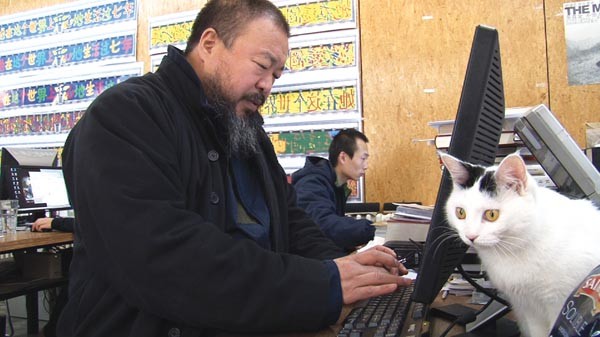Alison Klayman's film is a straightforward documentary about an extraordinary individual, the contemporary Chinese artist Ai Weiwei. Arguably China's most well-known artist, Weiwei enjoys fawning attention in the West, particularly for his pointed critiques of his homeland's government, while in Beijing, his celebrity and influence is constantly checked by the authorities.
Klayman interviews colleagues, sketches out Weiwei's background (including a stint in New York City in the 1980s), and focuses on the preparations for two big upcoming shows in Berlin and London. The artist proves an entertaining and articulate interviewee. (He's clearly a man in control of his own image and message.) There's great behind-the-scenes material for fans, and this is an excellent primer for anybody wishing to learn more about this much-discussed artist. (Weiwei was in the news last year when he mysteriously disappeared, and was feared apprehended by the government.)
The multi-disciplinary artist works in painting, sculpture, film, photography and installation art, and famously helped design the "Bird's Nest" stadium for the 2008 Beijing Olympics. (Like Warhol, Weiwei uses collaborators.) And he's such a prolific tweeter, with his dispatches covering art, politics and the personal, that it may be fair to claim Twitter as another of his artistic disciplines. In fact, as depicted in Never Sorry, Weiwei's facility with social-media technology is perhaps his most impactful ongoing work. He uses it not simply as a self-promotional tool, but to communicate from behind government firewalls, to rally supporters (including those in China who do so at their own risk), and to both collect and disperse information about China's curtailing of freedoms.
The film builds much of its narrative around Weiwei's quest to uncover exactly how many children died in the 2008 Sichuan earthquake, crushed in shoddily constructed schools. Stonewalled (and physically bullied) by the authorities, Weiwei uses social networking to eventually identify more than 5,000 students, and later incorporates these names into one of several works designed to both honor the victims and reveal the government's cover-up. The Sichuan-inspired pieces prove prime examples of how Weiwei transforms the mundane — names, or children's backpacks — into works of profound emotion and unmistakable political criticism. In English, and Mandarin, with subtitles.















